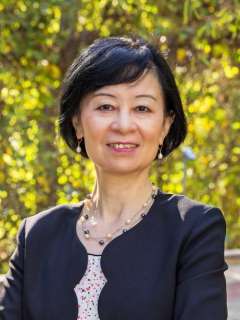
When UCLA School of Nursing was seeking a partner that would help establish the school as a global leader in nursing education, it had only to look down the road to UCLA Health.
With more than 600 nursing students, multiple degree programs and 36 full-time, doctorally prepared faculty, the school is a powerhouse in its own right. In 2021, its BSN program was ranked No. 10, its Master’s program was ranked No. 16 in the nation on the list of top Nursing Graduate Schools by U.S. News and World Report, and its NIH/NINR funding was ranked No. 20.
On top of that, the school had just hired a new dean and professor of UCLA School of Nursing, Lin Zhan, PhD, RN, FAAN, who was eager to sit down with UCLA Health Chief Nurse Executive Karen A. Grimley, PhD, MBA, RN, FACHE, NEA-BC, to identify opportunities to build a more enhanced partnership — one that creates a stronger voice for UCLA Nursing – academia and practice – that results in change in the profession at large.
“The overall strategy Dean Zhan and I talked about centers on how do we create entities that people identify as UCLA Nursing,” says Dr. Grimley, who also is assistant dean of UCLA School of Nursing. “There will be contributions that the health system will make and contributions that the school will make, but at the same time, people will walk away going, ‘Wow, that’s UCLA.’ We’re trying to create a seamlessness that hasn’t existed prior to this.”
Four areas of focus
Their focus has centered on four primary areas: strengthening the relationship between academic and practice Nursing; identifying areas in which both entities are involved and building upon that; strengthening its research partnership; and building a more robust Doctor of Nursing Practice Program by increasing participation from nurse leaders.
'The overall strategy Dean Zhan and I talked about centers on how do we create entities that people identify as UCLA Nursing.'
Karen A. Grimley, ucla health chief nurse executive and assistant dean, ucla school of nursing
One of the first areas they identified was their mutual work with the Hong Kong Sanatorium & Hospital. While the school was doing the didactic for the virtual nursing leadership program, the health system was providing clinical orientation and mentoring, Dr. Grimley says. She notes the work now is being shared through a redesigned curriculum and a mentorship program.
A clinical aspect is also in process to bring the nurses from Hong Kong to UCLA once the pandemic abates, Dr. Grimley says.
Another topic they’ve addressed is incorporating nursing students into UCLA Health, whether through opportunities for undergrads to serve at community clinics or for nurse leaders to serve as faculty at the school.
“For example, when Karen’s team has a homeless mobile clinic, we need our students to be part of that,” Dean Zhan says. “That should be part of their experience, understanding the homeless in L.A. and how nurses can play a leadership role in serving the underserved populations in the community.” Research was identified as another area of opportunity. Dean Zhan notes the school has top-notch researchers but grapples with how to best translate that into nursing practice.

“We have to collaborate and also have mentoring and partnership with nurses. They are very interested in the bedside and also in assisting in research to improve the safe quality of care that nurses provide,” she says.
Meeting the needs of the workforce
It is estimated that California will face a shortage of 45,000 nurses by 2030, and the two leaders have brainstormed ways UCLA can meet the growing crisis.
“How can we work together to meet dire needs of the nursing workforce?” Dean Zhan says. “It’s about time to invest in nursing.”
She notes that whereas UCLA’s overall acceptance rate for incoming undergraduates is 14%, the School of Nursing’s is just 1%.
Additional areas of focus include addressing nursing burnout, supporting evidenced-based practices, guiding new and returning nurses in practice readiness and ensuring UCLA Nursing has the curriculum and programs in place to meet rapidly changing health care demands.
Both leaders say the partnership is providing opportunities to challenge themselves and to look beyond the walls of UCLA for best practices.
“As we discover things we can do differently, I think it keeps the wonder and the passion in our profession,” Dr. Grimley says. “When there’s wonder and curiosity, there’s excitement and engagement. And it’s usually a wonderful product by the end of it.”
Jennifer Karmarkar is the author of this article.



